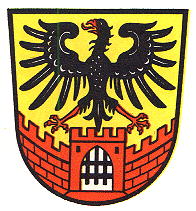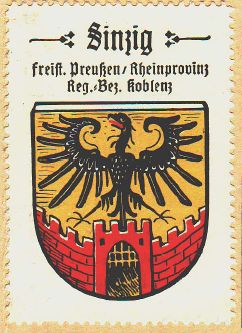Sinzig: Difference between revisions
Knorrepoes (talk | contribs) No edit summary |
Knorrepoes (talk | contribs) m (Text replacement - "|center]] ====Official blazon====" to "|center|Wappen von {{PAGENAME}}]] ====Official blazon====") |
||
| Line 7: | Line 7: | ||
Additions : 1969 Bodendorf, Franken, Koisdorf, Löhndorf, Westum | Additions : 1969 Bodendorf, Franken, Koisdorf, Löhndorf, Westum | ||
[[File:sinzig.jpg|center]] | [[File:sinzig.jpg|center|Wappen von {{PAGENAME}}]] | ||
====Official blazon==== | ====Official blazon==== | ||
Revision as of 07:31, 10 January 2016
This page is part of the German heraldry portal Deutsche Wappensammlung |
Heraldry of the World |
|
German heraldry:
|
Selected collector's items from Germany:
|
SINZIG
State : Rheinland-Pfalz
District (Kreis) : Ahrweiler
Additions : 1969 Bodendorf, Franken, Koisdorf, Löhndorf, Westum
Official blazon
Origin/meaning
During the middle ages a royal palace was situated near Sinzig. Sinzig received city rights in the early 13th century and the oldest known seal dates from the first half of the 13th century. The seal shows a King sitting on a throne, all placed above a city wall. From the 14th century onwards, the imperial eagle replaced the king. In the late 15th century the city wall disappears and until the 19th century all seals showed only the eagle.
In the mid 19th century the above arms were devised, based on the 14th and 15th century seals of the city.
| The arms by Hupp in the Kaffee Hag albums +/- 1925 |
Contact and Support
Partners:
Your logo here ?
Contact us
© since 1995, Heraldry of the World, Ralf Hartemink 
Index of the site
Literature : Stadler, K. : Deutsche Wappen - Bundesrepublik Deutschland. Angelsachsen Verlag, 1964-1971, 8 volumes.













